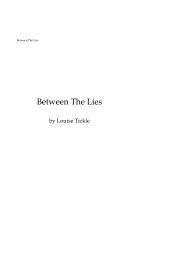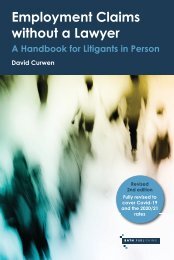Insolvency Made Clear: A Guide for Debtors
Plain English, practical guidance for anyone facing demands over a debt they are struggling to pay.
Plain English, practical guidance for anyone facing demands over a debt they are struggling to pay.
Create successful ePaper yourself
Turn your PDF publications into a flip-book with our unique Google optimized e-Paper software.
<strong>Insolvency</strong> Law <strong>Made</strong> <strong>Clear</strong> – A <strong>Guide</strong> For <strong>Debtors</strong><br />
In order to avoid an IPO, the Trustee is likely to offer an income payments agreement<br />
(IPA) under s310A of the Act. The Trustee can send a draft to the bankrupt,<br />
who will have 14 days to decide whether to approve it or state the reasons<br />
why they do not approve: typically because it does not allow expenditure on an<br />
item the bankrupt considers reasonable. This is a binding agreement, but it does<br />
not require court approval. It typically takes the <strong>for</strong>m where the bankrupt agrees<br />
to pay the Trustee £x a month <strong>for</strong> Y months. The IPA is likely to have provision<br />
<strong>for</strong> variation, in case the bankrupt gets a promotion or loses their job. An IPA<br />
is likely to lead to a better outcome <strong>for</strong> both the Trustee and the bankrupt. The<br />
Trustee will avoid the additional expense of going to court, and is likely to make<br />
a more generous offer in order to do so. As a policy, the OR allows a 14 day ‘cooling<br />
off ’ period following an IPA to give the bankrupt time to reflect on whether<br />
they are happy with the agreement. An IPA, once it has been agreed, can be<br />
en<strong>for</strong>ced as if it was a court order (s310A(2)).<br />
Both IPAs and IPOs can only last <strong>for</strong> three years beginning with the date of the<br />
order or the agreement. It is common to last the full three years. There is there<strong>for</strong>e<br />
an advantage to the bankrupt of agreeing the IPA as quickly as possible. The<br />
sooner it is agreed, the sooner it will be over.<br />
The court is not sympathetic to Trustees who apply <strong>for</strong> IPOs in order to recover<br />
funds <strong>for</strong> the creditors when the sum of money requested is disproportionate<br />
to the cost of the application itself. Given that a contested application will cost<br />
(say) £4,000 at 2021 rates and an IPO will last at most 36 months, the court will<br />
be unimpressed if the difference between the Trustee’s demand and the bankrupt’s<br />
offer is less than £100 per month. This factor is a useful point <strong>for</strong> negotiation:<br />
provided the bankrupt makes a reasonable offer, even if it is at the lower<br />
end of reasonable offers, the Trustee will feel pressure to accept it rather than<br />
make a costly application <strong>for</strong> an order. See Chapter 18 on settlement <strong>for</strong> further<br />
in<strong>for</strong>mation.<br />
In practice, the Trustee will give the bankrupt an allowance which they consider<br />
reasonable. The Trustee is likely to have a conversation with the bankrupt<br />
about what the bankrupt needs to spend money on, <strong>for</strong> example on fuel <strong>for</strong> the<br />
car, or clothing <strong>for</strong> children. The bankrupt may need to rely on social security<br />
<strong>for</strong> housing support or to supplement their income. This book does not describe<br />
the process <strong>for</strong> relying on support from the local authority or Universal<br />
Credit: see https://www.gov.uk/browse/benefits <strong>for</strong> more in<strong>for</strong>mation. The aim<br />
of a Trustee in Bankruptcy is not to let the bankrupt starve, but the Trustee will<br />
expect outgoings to be at a minimum to collect the extra money to distribute to<br />
the creditors.<br />
If the bankrupt suffers a loss in income or enjoys an increase, both an IPO and<br />
an IPA can be varied to change the amount to be paid. An IPA can be varied<br />
32













